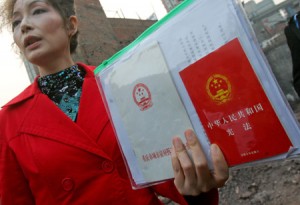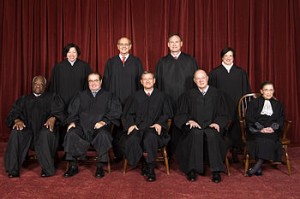Follow Up on the Wukan Protests – A Constitutional Challenge?
In the beginning of January, we posted a piece on the recent protests in Wukan, admitting that while there was something happening in Wukan, we at China Law & Policy where unclear what it was. Enter Prof. Keith Hand of UC Hastings School of Law, a specialist in Chinese constitutional law, who on Friday published a fascinating piece in the China Brief interpreting Wukan as a manifestation of the villagers’ constitutional discontent.
Hand’s piece teaches the lesson that, in analyzing legal developments in China, we are often prisoners of our own legal systems. Case in point is constitutional law. China is often criticized by foreign scholars about not having constitutional law; yes there is a law on paper, but the courts are prevented from hearing any constitutional claims and for American legal scholars used to constitutional jurisprudence being propounded by the courts, this is almost anathema.
But as Hand’s piece, “Constitutionalizing Wukan: The Value of the Constitution Outside the Courtroom,” emphasizes, the constitution is alive and still kicking in China. Courts may not hear constitutional claims, but such claims are still being made and still being interpreted in China, just outside the courthouse doors. For Hand, protests like Wukan and the subsequent government response serve the same role as the courts in interpreting the constitution. In Wukan, the villagers protested for their version of the Chinese constitution and the government, in its compromise with the villagers, provided theirs, moving constitutional jurisprudence forward. As Hand points out, this explains why Chinese constitutional scholars are interpreting the Wukan protests in a positive light and as one of the most important constitutional cases of 2011, even though it never made it to a courtroom.
This grassroots, constitutional interpretation is not absent from America. In fact, as Hand mentions, some American constitutional scholars view many popular protest movements as an important part of moving society – and in the U.S., the courts – forward to a different view of the constitution and have called this “popular constitutionalism.” Could the Supreme Court handed down all of its decisions of the 1960s without the Civil Rights Movement and the Women’s Rights Movements?
Will constitutional claims ever be heard in a Chinese court? Who knows, but as Hand makes clears, constitutional jurisprudence i happening in China, just not where most Americans might look to find it.
For a deeper understanding of popular constitutionalism in China, read the Hand’s short piece here.
 On Facebook
On Facebook By Email
By Email 

